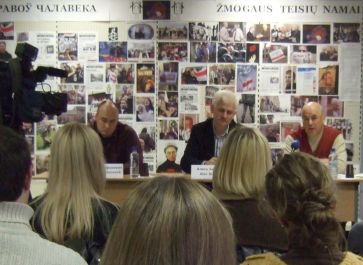Within the framework of the election monitoring campaign, “Human Rights Defenders For Free Elections”, Belarusian human rights defenders observed parliamentary elections in Belarus held on 28 September 2008 and the whole election campaign. Three representatives of the campaign, including Ales Bialiatski, Vice-President of the International Federation of Human Rights; Harry Pahaniaila, Head of the Legal Commission of the Belarusian Helsinki Committee; and Valiantsin Stefanovich, Deputy Chair of the Human Rights Centre Viasna; spoke about the numerous violations registered during the elections.
 The panelists noted that while the Belarusian authorities seemingly created conditions for the independent observation of the elections and invited OSCE observers, at the same time members of election commissions shamelessly breached both international standards and even home legislation.
The panelists noted that while the Belarusian authorities seemingly created conditions for the independent observation of the elections and invited OSCE observers, at the same time members of election commissions shamelessly breached both international standards and even home legislation.
According to Harry Pahaniaila, this year’s election campaign was the quietest campaign in Belarus in the last 15 years, with no real competition or debate. The oppositional candidates traditionally had little if any access to the media or other campaigning opportunities.
Early voting was traditionally used to ensure a high voter turnout. Students, teachers and other categories of citizens heavily dependent on the state as their employer or provider of education or other services were forced to vote early under threat of expulsion, dismissal, or eviction from accommodation provided by state organizations.
To further artificially increase the percentage of those who voted in the elections, the authorities deleted thousands of names from the voters’ lists. This was the case with Ales Bialiatski, who did not find himself on the list of voters when he came to the polling station where he had been voting since 2000. His name was quickly added to the list and the omission was explained as a technicality. However, numerous similar cases were reported by many observers.
During the vote count, the observers were not allowed to come closer than several meters to members of the election commissions who did the counting, and all the observers could see where the backs of the commission members and sheets of paper passed from one pair of hands to another. One of the observers managed to film the vote count at one of the polling stations in Minsk, and similar situations were reported at other polling stations in Belarus.
Stressing the importance of making the information on the registered breaches known to Belarusian citizens at large, the human rights defenders recognized the difficulty of doing it in the current media environment in Belarus, where the state-owned print media by far exceed the independent ones in circulation, and television is completely occupied by the government. In such circumstances the Internet may become a partial solution of the problem, but even this resource is not sufficient in Belarus. How to effectively and broadly inform the public about the actual situation in the country remains a problem that needs a complex solution by all pro-democracy forces.
More detailed conclusions drawn by the human rights defenders are available here.


